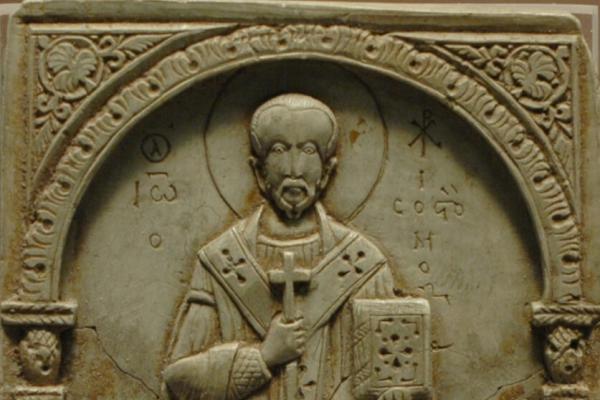The city of Antioch — in modern-day Turkey — was beautiful and bustling in the fourth century. Various emperors and wealthy patrons donated money to build a colonnaded street through the middle of town. Well-to-do citizens decorated their marble halls with colorful frescoes and statues. They demonstrated their wealth by plating their walls and rooftops with gold. Even the city’s cathedral was called the “Golden House.” It would eventually seat a Patriarch, John, nicknamed “Chrysostom” or “Golden Mouth.”
John, however, earned the name “Chrysostom” not for his wealth but for his aureate homilies, sermons that left his audience both inspired and convicted. In fact, John came from an ascetic order of Egyptian monks. Though he grew up in relative privilege and even received a rigorous education, he traded his life as an up-and-coming philosopher for the life of a hermit. In his monastic service, he eschewed material belongings. It was his close friend, St. Basil, who convinced him to take on the ministry of the priesthood.
So what happens when a hermit stands to preach in the Golden House before a congregation of social elites?
Let’s just say that if John were not such a brilliant speaker, I can’t imagine that the elites of Antioch would have allowed him to preach for as long as he did. He constantly criticized them for showing off their wealth. He harped on their accumulation of money so much it annoyed them. And he knew it! In his 30th homily on 1 Corinthians he says,
Perhaps some thoughtless or scoffing person will object to what I’ve said, and will altogether deride us, saying, “How long will you not cease continually introducing poor men and beggars in your sermons, and prophesying our misfortunes, and denouncing poverty to come, and desiring to make us beggars?” I don’t wish to make you beggars, but to open up for you the riches of heaven!
Perhaps it is anachronistic to call John a communist. Yet, he viewed private property as a distinctly un-Christian idea and expected the church to lead society into property-less, communal living. He said, “One’s goods are not his own, but belong to his fellow servants.”
To John, rich people are responsible for hunger. He preached that gaining wealth necessarily means that some injustice has occurred in the process. The fact of uneven distribution of wealth is itself proof of abuse.
John preached that withholding your wealth from the poor, regardless of what they might do with that money or how they became poor in the first place, is theft. In a homily on the book of Hebrews, he says:
If you see anyone in affliction, do not be curious to inquire further. His being in affliction gives him a just claim to your help. For if when you see a donkey choking you lift him up without inquiring whose he is, you certainly ought not to be over-curious about a person. He is God’s, whether he is a heathen or a Jew; since even if he is an unbeliever, still he needs help.
It’s quite a startling contrast when you compare this with much of contemporary American Christianity, which often claims that the poor are to blame for their own poverty.
John believed that all Christians were “self-ordained” priests to the poor. When we give to the poor, we enter into the a greater Holy of Holies and offer sacrifices on a greater altar, built by God himself, composed of human souls. Indeed, it is the body of Christ himself.
The idea that the poor and hungry are Christ’s body is one of the central tenets of John’s theology of poverty. It comes from Matthew 25:31-46 where Jesus, speaking of the final judgment, says that those who feed and clothe the poor, who visit the prisoner, who welcome the stranger are doing so to Christ. And eternal punishment awaits those who refuse—those who drive past the panhandler with disdain, those who ignore the cries of prisoners, those who refuse to welcome strangers from distant lands.
John practiced what he preached. In Antioch, he led his congregation to use the Church’s buildings as a hostel for travelers. They operated a hospital for those with incurable illnesses and had a registry for widows and ensured that they were taken care of. When he later became Archbishop of Constantinople, he drastically cut his own salary and gave it instead to the local hospital.
When the hospital couldn’t handle the healthcare of the entire city, John had the church build more hospitals. This is someone who saw the needs of his community, the systemic problems in wealth disparity, and he did something about it.
What we — as faith communities — do for others says a lot about what we believe about God and about our neighbor. Indeed, our actions say everything that needs to be said about our beliefs.
How do we treat the woman panhandling at the intersection with track marks on her arm, the undocumented man working in the fast food kitchen to send money home to the family he misses, or the prisoner who has lost years of his life for a nonviolent drug offense? How, by contrast, do we treat the wealthy members in our community?
How would we feel if St. John Chrysostom stood at the pulpit before us this Sunday?
Got something to say about what you're reading? We value your feedback!







